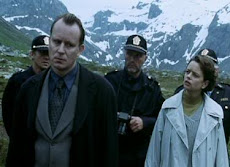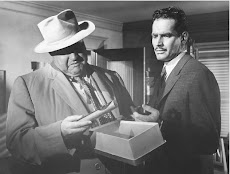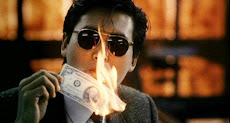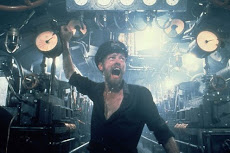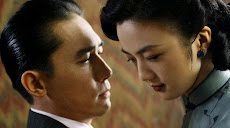One cannot escape hearing about The Hunger Games any more than one could escape The Girl With the Dragon Tattoo ten minutes ago, the Harry Potter franchise before that and The Da Vinci Code before that. The Hunger Games broke box office records this weekend and the book it's based on remains #1 across the board on Amazon at the time of this writing. It's certainly making a lot of people a whole lot of money, and more power to them.
But what's all the hype about? Beats me, frankly.
Sometimes movies are just supposed to be fun and don't need a message to be enjoyable. I get it. Seriously. But The Hunger Games masquerades as a film that does, in fact, have a message. If not deliberately written that way, that's certainly the opinion of popular culture. And it does indeed have one, it's just dangerously shallow, or at best incomplete. (I cannot opine on quality of the film's adaptation of The Hunger Games novel since I have not and do not intend to read it, but this saves me the risk of superimposing messages that might be in the book into the film. The film is an adaptation of--not a supplement to--the book, so it must stand on its own merits.)
 You probably know the plot, and it really is that simple. In a bad future, the world (or country, whatever) is divided into 12 districts. Each district must offer up a yearly sacrifice of one adolescent male and one adolescent female to duke it out against each other and the kids from other districts in a winner-take-all battle royale (oops) to the death. This is broadcast to the populace. It's called the Hunger Games, and despite that not making a whole lot of sense I do have to admit it sounds pretty cool.
You probably know the plot, and it really is that simple. In a bad future, the world (or country, whatever) is divided into 12 districts. Each district must offer up a yearly sacrifice of one adolescent male and one adolescent female to duke it out against each other and the kids from other districts in a winner-take-all battle royale (oops) to the death. This is broadcast to the populace. It's called the Hunger Games, and despite that not making a whole lot of sense I do have to admit it sounds pretty cool. The purpose of these Hunger Games is, to put it mildly, ridiculous: the districts rebelled around 74 years prior, and the games are an eternal punishment and reminder to the districts of the futility of standing up to the Man. As dictator-for-life (?) President Snow (played to a tee by Donald Sutherland) informs "game master" Seneca Crane (Wes Bentley), the games are meant instill fear, with only the smallest batch of hope, because too much hope will override the people's fear of government. (Deep.)
Although this has somehow worked for 74 years, this time one Katniss Everdeen (Jennifer Lawrence), from the poor backwater District 12, has brought not only A-game bow and arrow skills to the games, but virtue and appeal that somehow wakes up the rage of the populace by bringing sudden awareness to the fact that they are sacrificing their children to the government.
This political backlash is only a sideshow: the focus of The Hunger Games is on the actual Hunger Games and the toils of teenagers being forced to survive by killing one another off. The acting is excellent, as are the makeup and special effects, and the action is exciting. But the heroism of Katniss Everdeen (a name that remains very hard to say with a straight face) is not how well she plays the game without succumbing to beastly human nature, but how she sticks it to the Man and turns the Hunger Games on its head. This just happens, without us knowing exactly how she's accomplishing this (read: why no one figured out the problem of the Hunger Games before) or what change she intends to bring.
To be sure, tyranny is tyranny; sic semper tyrannis and all that. Tyrannical governments like those in The Hunger Games are evil and should be overthrown. But it begs the question: what do we replace them with? What ideals and virtues would young Katniss (and whoever else might support her) seek to instill in the new regime besides, well, other better stuff?
This is not only a necessary question, it's one of the most important questions to mankind: how shall we be governed? To make a film that illustrates how bad things can get with government is fine, and it's a noble thing to promote the destruction of such regimes, but it seems an oh-so-unimportant afterthought to ensure the protagonist will not set up a government that is just as bad, or worse.
Again, I'm not against fun films (bah humbug), and The Hunger Games did not need to add to its 2 1/2 hour running time with a discourse on natural rights (though Woody Harrelson would have been one to deliver it), but I'm concerned that its empty Fight-the-Power grandstanding reinforces for American teens (and far too many adults) that they are to be guided merely by their own consciences with no need for study, dialogue or reflection. Basically, when you're right, you're right, and you're right!
Sci-fi has done far better. There is no better example than Norman Jewison's Rollerball (1975). (Not to be confused with the horrible, horrible remake.)
While the Hunger Games are meant merely to instill fear, the game of rollerball was designed as propaganda to reinforce the very structure of a tyrannical state. As the insidious Mr. Bartholomew, John Houseman describes this regime succinctly:
So now we have the majors and their executives. Transport, Food, Communication, Housing, Luxury, Energy. A few of us making decisions on a global basis for the common good. The [rollerball] team is a unit. It plays with certain rhythms. So does an executive team, Jonathan. Now everyone has all the comforts, you know that. No poverty, no sickness. No needs and many luxuries, which you enjoy just as if you were in the executive class. Corporate society takes care of everything. And all it asks of anyone, all it has ever asked of anyone ever, is not to interfere with management decisions.Another dastardly conversation illustrates just why Jonathan E (James Caan), an expert rollerball veteran, threatens the regime by staying in the game instead of retiring:
No player is greater than the game itself. It's a significant game in a number of ways.The velocities of the ball, the awful physics of the track. And in the middle of it all, men playing by an odd set of rules. It's not a game a man is supposed to grow strong in, Jonathan.The absolute authority of the collective over the individual (although, not so ironically, governed by but a few individuals)? Now that's some serious business.
And, so, the triumph of Jonathan E far far surpasses that of Katniss:
And, yes, today's soundtracks don't hold a candle to Bach.



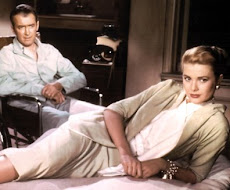_01.jpg)






